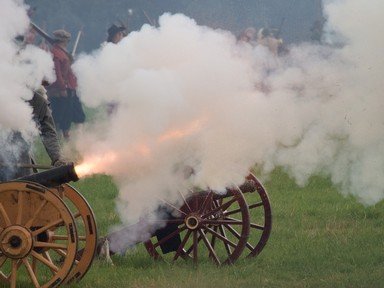Quiz Answer Key and Fun Facts
1. Apart from a few minor skirmishes, Bosworth Field was the final battle of which war?
2. On which day was the Battle fought?
3. The victor at Bosworth was a man born in Wales who was proclaimed King shortly after the battle. Who was he?
4. After the end of the Wars of the Roses the Houses of York and Lancaster were united in a single family.
5. One of the reasons given for Richard's defeat was the refusal of two brothers to commit their armies to the King. Who were these traitors?
6. After the battle Richard's naked and bloody corpse was taken to Leicester and displayed for all to see that he was truly dead. Richard was later buried at Grey Friars but, according to local legend, that was not his final resting place. Where did people believe his bones finally moved to?
7. Many myths and legends have sprung up since the battle. One of these involves Richard's spur striking a particular place on leaving Leicester on the eve of the battle. Where did his spur hit?
8. Although both Richard and Henry were descendants of Edward III, Richard had the much stronger claim to the throne.
9. When Henry Tudor crossed back from his exile in France to seize the throne of England, where did his invasion force land?
10. According to Shakespeare, Richard was a deformed hunchback, and in his final minutes called out 'A horse, a horse, my kingdom for a horse'. Most of the accounts of Richard come from other Tudor propaganda. However, his final words are documented. What were they?
Source: Author
romeomikegolf
This quiz was reviewed by FunTrivia editor
bloomsby before going online.
Any errors found in FunTrivia content are routinely corrected through our feedback system.
